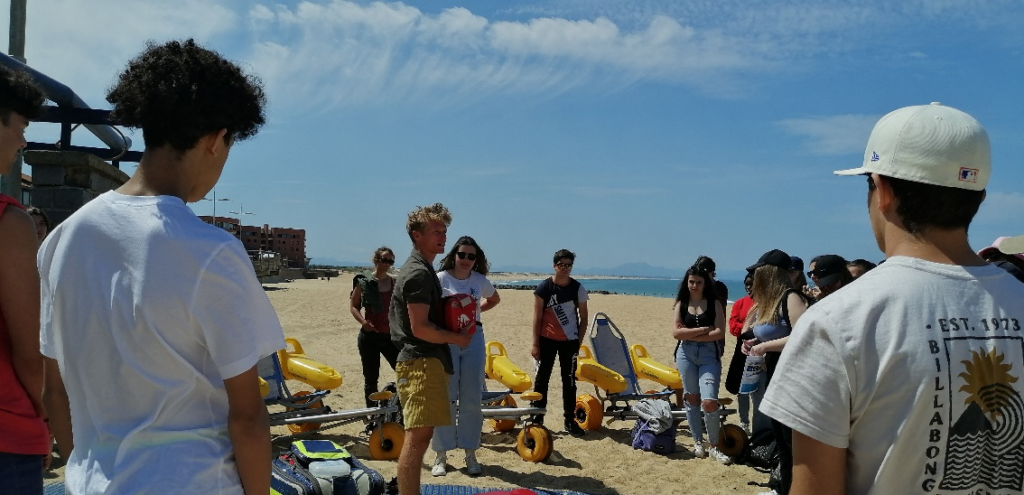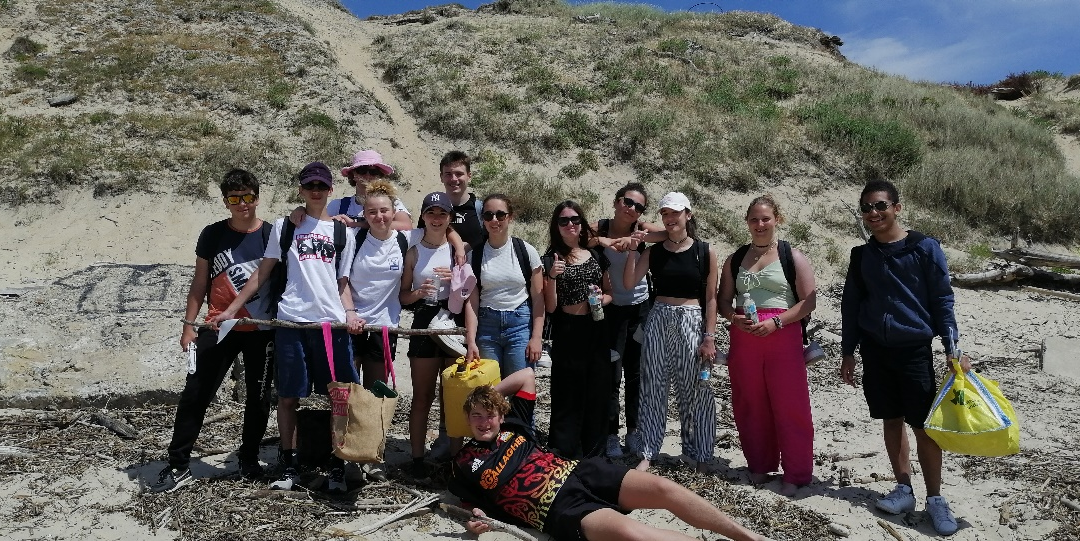Sortie pédagogique à Capbreton mardi 31 mai 2022 avec les classes de secondes 5 et 9.
Les élèves ont découvert les activités quotidiennes des « maitres nageurs sauveteurs », ou “éducateurs sportifs des activités de la natation” comme on les appelle aujourd’hui, et nettoyé des plages dans le cadre de l’éducation à l’environnement et au développement durable en cours d’anglais. Voici leurs histoires.
Protect our oceans, they are the only ones in the solar system!
On Tuesday, May 31st we went to Capbreton to meet lifeguards and to clean the beach. We learnt the necessity to protect the ocean to guarantee the best future possible for our next generation and limit global warming. Romain, a lifeguard in Capbreton, taught us the dangers of the Ocean and how to save lives. So we are going to tell you what we learnt with the lifeguards and next, we will show you what we found on the beach.

A DAY WITH THE LIFEGUARDS:
On Tuesday, May 31st, we went with our class to Capbreton where we collected trash on the beach and met with the lifeguards. During the meeting, they taught us a lot about their job, the different activities of the day, their duties and responsibilities.

Their main missions are to give information on the sea by filling in a white board every morning with multiple data which look insignificant to them but are really important to tourists like the temperature of the water or the tides. After that they prepare the beach and start supervising people and radio frequencies for the day. Since the beach is also accessible to disabled people, they help them on the beach to permit them to enjoy water.
To become a lifeguard, you have to pass the BNSSA, a swimming and rescue diploma, and the PSE 1 and 2, a first-aid certificate. You can apply to this job if you’re a woman or a man older than 17 and if you’re sporty, healthy, brave and passionate about the sea and rescuing. Most of the lifeguards work 3 to 5 years during their studies, if they stay longer they can be promoted and become instructors. They work during the summer period, from May to October, around 38 hours per week and they supervise the beach from 11 a.m. to 18 p.m. The salary goes from € 1,200 to more than € 2,000 for an instructor. They can work in different European countries with their French diplomas and in the world if they take an equivalent training course.
After that, they presented the equipment, like the rescue board, the paddle board, the lifebelt and the fins to rescue people on the sea. They also presented the automatic defibrillator, the first emergency backpack and the stretcher for emergency on the beach, when someone loses consciousness or if their heart stops beating. In the aid station there is a room with a bed for patients who need care like putting a band aid on a wound or if they need rest. Each lifeguard can rescue 2 to 3 people a day on average.
We learned a lot on this field trip, they taught us the first aid technique and what to do in case of emergency, it was a really enriching experience. We really enjoyed this day at the beach.
Jade SIRET, Maëlle de NERIS, Lucille BIANCHINI et Anaïs PIGNOUX
SAVING LIVES
On Tuesday, May 31st, we went to the beach in Capbreton with the class.

We met lifeguards and we talked with them about the importance of their job. We visited their workplace. There are oxygen, medication and a bed in the room for victims. Moreover, there are a changing room, a kitchen, a radio…
To become lifeguards, we have to pass the PSE1 and 2 accessible at 16 years old and the BNSSA accessible at 17 years old. It’s sporty and rescue diplomas.
Their mission consists in protecting people on the beach and in the sea. Every day they write information about the tide, the temperature of the water, the currents and the weather.
They need to be brave, sporty, healthy, fit and hardy. They work 38 hours per week from 11am to 6pm. They supervise the beach from May to October.
They use much equipment like a rescue board, a life belt, an automatic defibrillator, wheel chairs for the disabled.
Their salaries go from €1,600 to more than €2,000. A lifeguard can work between 3 to 5 years and they can change workplace in different countries.
This information was presented by Romain.
Sara, Camille, Vanille, Lilian, Alix (2°9)
THE OCEAN POLLUTION IS ALARMING !!!
On Tuesday 31 May we went to Capbreton in order to clean the beach. And we picked up litter for 2 hours. Precisely we filled a lot of plastic bottles and bags, with small single-use objects. For example, cigarette butts, cotton buds, packaging of hygienic litter and a lot of small pieces of plastic.

The consequences are very serious, even alarming for the future. In fact, all this litter is very polluting, because microbeads remain in the water. And this is going to have a big impact on the ecosystem. For example, a cigarette butt pollutes 1,000 litres of water. And on earth the degradation of a butt which has a filter is between 2 and 6 years.
The impact on marine animals and humans is also serious, first because a lot of fish eat the fishing nets or the pieces of plastic and secondly because it makes the swimming less pleasant.To become aware of that, we went to Capbreton. The picture shows two students of our class: Marco and Remy. We can see that they picked up a lot of trash, specially a sun shade or a garden hose. This litter would never have biodegraded naturally.
We have become aware of the big pollution in the ocean. And we are going to change our consumers’ habits in order to save the world.

SO PLEASE STOP CONSUMING PLASTIC!!!!!
From the best reporters of Charles Despiau High School: CASSAGNE Lisa-Margaux, PINABEL Clara, ROZBORSKI Tiffany, VIANA Emma
The waste bottles

On Tuesday 31 May, we went to Capbreton to work on our project on the protection of the environment. During 2 hours, we filled bottles of waste and several bags. The objective was to clean the beach to protect the animals and humans. We found different things, there were plastic bags, cotton buds, cigarette butts, driftwood, a sunshade, jerrycans… This waste is very bad for the environment. Indeed this waste takes hundreds of years to disappear. For example, it takes 400 years for a plastic bag to disappear. The marine animals eat microbeads and we eat the fish but the microbeads can be bad for the humans because we consume them. It is therefore important to separate your waste, recycle it and put it in the bin.
Reporters: Satine, Luc, Luna, Zélie


